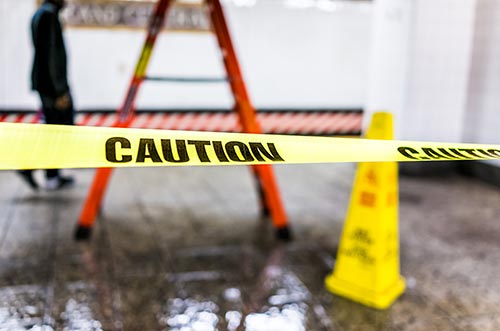Frequently Asked Questions About Premises Liability
Accidents on other people’s property are some of the most stressful and difficult cases. We have seen many people struggle to pursue compensation when they most need it. The reason for those struggles, more often than not, was a lack of information.
At Bennerotte & Associates, P.A., we want to answer all your questions about the complex area of law that deals with falls and dog bites. The questions you have may be intensely personal to your situation and will require a consultation with one of our lawyers. Here we provide answers to some general questions to get you started.
What is premises liability?
Premises liability is the theory of law that property owners have certain duties to the people who may be on their property. The basic idea is that the property that a person enters should be safe and free from hazards. No one who enters a home or a business expects to fall through a hole in the floor, and if they did, the owner of that property might be liable.
What are the duties of a property owner?
The duties of a property owner are wide and fall under two categories:
- The duty to care: The property owner must take reasonable steps to ensure their property is safe for visitors. This means cleaning spills, fixing walkways, ensuring snow removal, removing hazards and other such actions.
- The duty to warn: If there is a hazard that cannot be removed, the owner of the property must take steps to ensure people know it’s there. This can include a hotel taking steps to warn people about possible criminal activity in an area.
If you have an injury you received on another’s property, and you believe the hazard shouldn’t have been there or you should have had a warning, you may want to contact our office.
What are the most common types of premises liability injury?
The most common types of premises liability cases are:
- Dog bites
- Slip-and-falls
- Negligent security
These are very common types of incidents that can leave people in serious medical conditions.
Is the property owner always liable?
Property owner liability is a complex area. There are some incidents where an injured person didn’t take reasonable care. In a case like that, there can be questions about property owner liability. However, generally speaking, if there is a hazard on a piece of property, the owner should take steps to mitigate that hazard.
What is negligent security?
Negligent security typically falls under a failure of a “duty to warn.” The most common scenario is a hotel not warning its guests of the possibility of crime in the area. They can also be liable for not having proper security cameras or fencing.
If there is a reasonable cause to have concerns about the area or a guest’s safety, the property owner must take some steps to address that. Not doing so leaves people vulnerable and opens the property to liability.
What if the property owner was a neighbor or family?
It’s natural to feel some discomfort at the concept of pursuing a neighbor or a family member for compensation after an injury. However, that is not something you should have as your main concern because often, that person will have insurance that should cover the injury. Furthermore, your relative or neighbor may even believe they should pay for the injury.
The problem comes from the insurance company, which will aggressively fight your claim. They will do it in your neighbor or family member’s name. The court paperwork will list you as a plaintiff against your relative, but the truth is your fight is with a large insurance company seeking to make your life a little harder.
What about accidents where someone was trespassing?
There are actually levels of visitors to a property, from the expected visitor – such as a customer in a grocery store, invited guests and, yes, trespassers. Trespassers can come in several forms, from children who find an “attractive nuisance” on a person’s property to actual trespassers.
In the case of trespassers, they are, for the most part, an exception to the duty to care. However, if property owners are aware of frequent trespassers to a certain area, they must take care to fix any hazards or warn off trespassers from any unfixable hazards. Also, under no circumstances can a property owner leave a trap for trespassers.
What can a lawyer do for me?
A lawyer can take away the burdens of pursuing compensation and help you minimize your stress going forward. They can answer questions for your insurance company. A lawyer can help you get the care you need. If you need a lawyer for your premises liability injury, contact us at (651) 240-3309 or send us an email.


